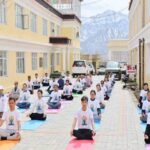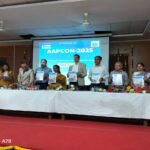India
healthysoch
Chandigarh, June 15, 2020 :
The novel Coronavirus, COVID-19 has disseminated as a pandemic in the entire world. Despite of the relentless efforts being made by the Government of India; it is now getting crucial to employ therapeutic methods mentioned in our Ayurvedic scriptures along with its modern research validations, for controlling the further spread of COVID-19. In this context, Patanjali Research Institute has taken pioneer steps for the effective treatment of COVID-19 infection. Insilico studies of more than 100 medicinal herbs used in Ayurveda has been conducted at lengths.
The post-experimental analysis exhibited that a phytochemical, namely, Withanone, found in Withania somnifera (Ashvagandha) could prevent the entry of COVID-19 in the host cells, by destabilizing the interaction interphase.
This work is currently under Peer-review for publication in the Virology journal of SpringerNature. A similar mode of action has also bee predicted for Tinocordiside, a phytochemical present in Tinospora cordifolia (Giloy) and Scutellarein, a compound from Ocimum sanctum (Tulsi). These phytochemicals prevent and protects from the COVID-19 infection and restrict its multiplication, along with increasing human’s innate-immunity. For symptomatic relief, Swasari Ras (Vati), mentioned in Ayurveda, has proved to be highly beneficial in regulating lung inflammation and excessive mucus formation. This research work has been recently published in Biomedicine and Pharmacotherapy, an Elsevier journal (https://doi.org/10.21203/rs.3.rs-17806/v1).
In addition, the use of Anu taila as nasal drops (Nasya therapy) has been considered to be effective in curbing
COVID-19 infectivity and associated upper-respiratory ailments.
Treatment Regime, Dosage forms and Mode of administration :
1. Anu Taila (Nasya therapy)
4 drops of Anu taila to be put in each nostril, at least 60 minutes before breakfast, every morning.
2.Swasari Ras (Vati) : 2 Tablets
To be administered twice, 30 minutes before breakfast and dinner, along with luke-warm water.
3.Pure Giloy Ghanvati: 2 Tablets
Pure Ashvagandha Capsule: 1 Capsule
Pure Tulsi Ghanvati: 1 Tablet
To be administered twice, 30 minutes after breakfast and dinner, along with lukewarm water.
Note: In case of excessive mucous and cough, 2 tablets of Swasari Ras (Vati) could also be given 30 minutes before lunch. In addition, 4 drops of Anu Taila (Nasya therapy, 4 drops in each nostril) could also be administered 60 minutes before meals.
Above mentioned therapeutic regime is applicable for adults ageing between 15-80 years. Children of the age of 6 to 14 years could take half the dosage advised for adults.
In addition, according to one’s ability, Yoga and exercise should be practiced every morning (empty stomach) so as to protect against the infection of Coronavirus and to strengthen the immune system and lungs. More specifically, Bhastrika (05 minutes), Kapala Bhati (15 minutes), Ujjaayi (08 – 10 times), Anulom-Vilom (15 minutes), Bhramari Pranayam (08 -10 times) and Yoga should be practiced regularly. Moreover, gargling with luke-warm water, consisting of Triphala, Mulethi (Liquorice), and rock salt or Haldi (Turmeric) is recommended twice a day.
In case of an emergency (Emergency/Critical condition), one should follow the medical procedures prescribed by the Government of India.
In addition, must follow these rules.
- Wear Mask
- Wash Your Hands
- Maintain Social Distancing
Patanjali Research Institute
Patanjali Yogpeeth Trust, Haridwar, Uttarakhand
healthysoch







